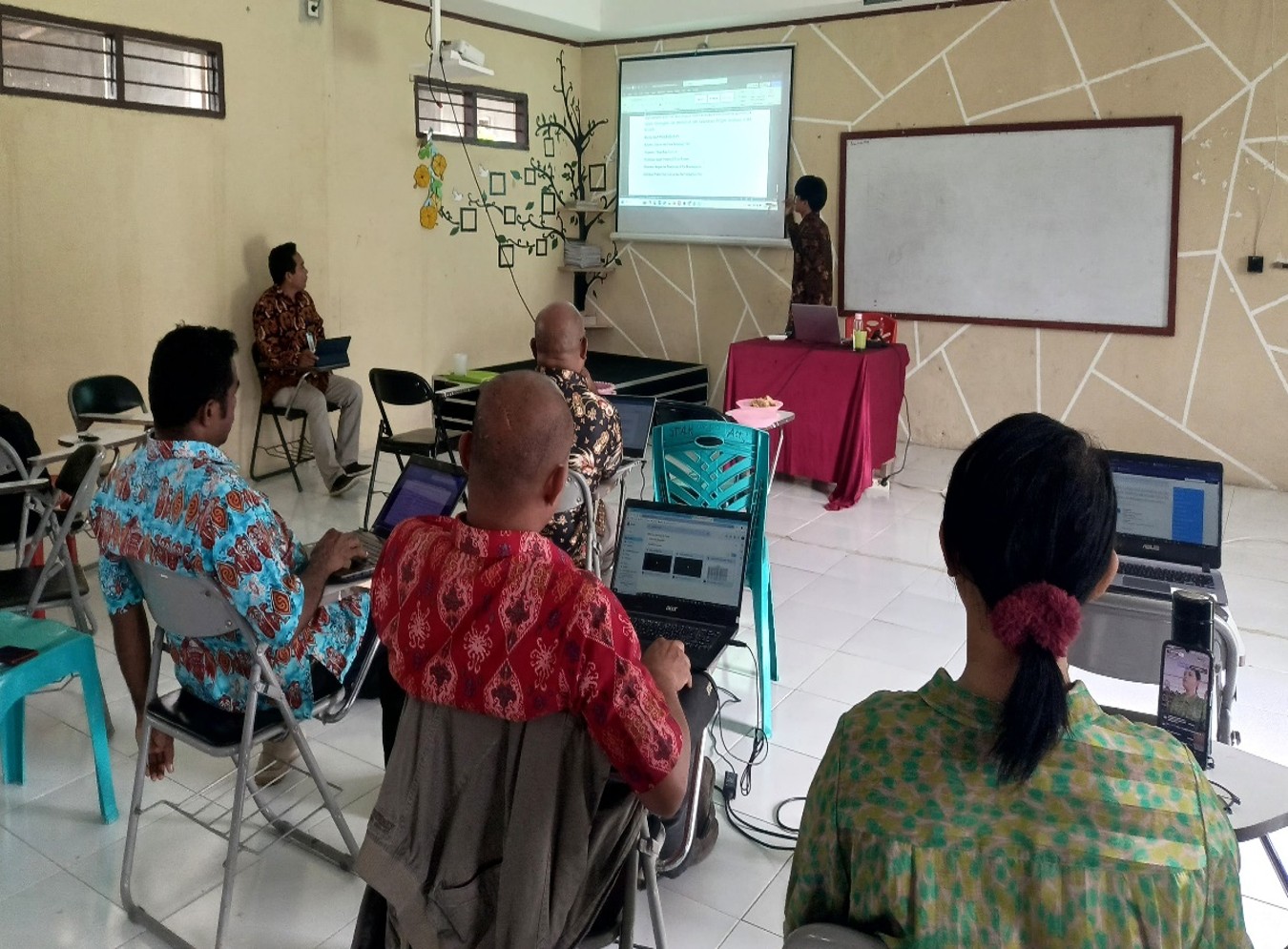Pengenalan Artificial Intelligence sebagai Asisten Digital dalam Penulisan Artikel Ilmiah bagi Dosen di STAK Arastamar Grimenawa Jayapura
DOI:
https://doi.org/10.47457/jps.v6i1.567Keywords:
artikel ilmiah, dosen, kecerdasan buatan, kristianiAbstract
This Community Service Program was conducted at STAK Arastamar Grimenawa Jayapura from January 13-15, 2025. The background of this service stems from the need to enhance lecturers' competencies in utilizing AI technology as a digital assistant for academic writing. The program aims to introduce and train lecturers in using AI technology responsibly to produce high-quality scientific works that align with Christian values. The implementation method comprises five stages: observation, planning, training execution, academic study writing, and evaluation. The novelty of this service lies in integrating technical aspects of AI usage with Christian spiritual values in the context of academic writing at theological education institutions. The results show significant improvement in lecturers' ability to utilize AI applications to enhance grammar quality, originality, and structure of scientific articles while maintaining spiritual and academic integrity. This program successfully bridges academic needs with theological missions through ethical and responsible use of AI technology.
Downloads
References
Barwegen, Laura. 2019. “The Value of Social Science Research in Christian Education Programs.” Christian Education Journal: Research on Educational Ministry 16, no. 3: 495–510. https://doi.org/10.1177/0739891319874357.
Chabata, Lovejoy. 2024. “Artificial Intelligence and Afrocentric Biblical Hermeneutics Crossroads in Zimbabwe (Col. 2:8).” HTS Teologiese Studies / Theological Studies 80, no. 1: 1–7. https://doi.org/10.4102/hts.v80i1.10106.
Connaway, Lynn Silipigni, and Marie L. Radford. 2021. Research Methods in Library and Information Science. USA: BLOOMSBURY.
Dergaa, Ismail, K. Chamari, P. Żmijewski, and H. Ben Saad. 2023. “From Human Writing to Artificial Intelligence Generated Text: Examining the Prospects and Potential Threats of ChatGPT in Academic Writing.” Biology of Sport 40, no. 2: 615–22. https://doi.org/10.5114/biolsport.2023.125623.
Fitria, Tira Nur. 2021. “QuillBot as an Online Tool: Students’ Alternative in Paraphrasing and Rewriting of English Writing.” Englisia: Journal of Language, Education, and Humanities 9, no. 1: 183–96. https://doi.org/10.22373/ej.v9i1.10233.
Glenwick, David, and Leonard Jason, eds. 2016. Methodological Approaches to Community-Based Research: Qualitative, Quantitative, and Mixed Methods. New York: Oxford University Press.
Gulo, Rezeki Putra, and Sandra Rosiana Tapilaha. 2024. “Reforming Christian Religious Education: Integrating Spirituality and Critical Reasoning in the Digital Era.” Didaché: Journal of Christian Education 5, no. 2: 105–23. https://doi.org/10.46445/djce.v5i2.837.
Jr., Michael J. Paulus, and Michael D. Langford. 2022. AI, Faith, and the Future: An Interdisciplinary Approach. Eugene: Wipf and Stock Publishers.
Khlaif, Zuheir N, Allam Mousa, Muayad Kamal Hattab, Jamil Itmazi, Amjad A Hassan, Mageswaran Sanmugam, and Abedalkarim Ayyoub. 2023. “The Potential and Concerns of Using AI in Scientific Research: ChatGPT Performance Evaluation.” JMIR Medical Education 9: 1–16. https://doi.org/10.2196/47049.
Mahmud, Saadia, ed. 2024. Academic Integrity in the Age of Artificial Intelligence. Australia: IGI Global.
Napitupulu, Anton, and Rezeki Putra Gulo. 2024. “Artificial Intelligence Dan Transformasi Pendidikan Kristen: Integrasi Teknologi Cerdas Ke Dalam Pembelajaran.” MEFORAS: Jurnal Teologi Dan Pendidikan Agama Kristen 1, no. 1: 63–75.
Nenomataus, Ade Epatri, Djoys Anneke Rantung, and Lamhot Naibaho. 2024. “Integrasi Etika AI Dalam Pendidikan Agama Kristen: Tantangan Dan Peluang.” NUSRA: Jurnal Penelitian Dan Ilmu Pendidikan 5, no. 3: 1387–93. https://doi.org/10.55681/nusra.v5i3.3173.
Patty, Jusak, and Stella Rose Que. 2023. “Pemanfaatan Artificial Intelligence (AI) Dalam Penulisan Artikel Ilmiah.” Communnity Development Journal 4, no. 4: 9318–22. https://doi.org/10.31004/cdj.v4i4.20437.
Puspitasari, Indah, Agung Budi Kurniawan, Siti Mariyam, and Nova Alfadillah Rukmana. 2020. “Artificial Intelligence Dalam Penulisan Artikel Ilmiah.” In LPPM PRESS STKIP PGRI Pacitan, 1–6.
Roche, Joseph. 2022. Essential Skills for Early Career Researchers. USA: SAGE Publications.
Rolnik, Zachary. 2024. “The Impact of Artificial Intelligence on Academic Research.” Universal Library of Innovative Research and Studies 1, no. 1: 09–11. https://doi.org/10.70315/uloap.ulirs.2024.0101002.
Sianipar, Desi, ed. 2024. Inovasi Pendidikan Agama Kristen Di Era Artificial Intelligence. Bandung: CV Widina Media Utama.
Sihombing, Sabrina O. 2023. Transformasi Penelitian Ilmiah: Mengoptimalkan Metode Penelitian Dengan Kecerdasan Buatan. Jawa Tengah: Penerbit NEM.
Swargiary, Khritish. 2024. Research Methodologies: Evolution, Practice, and Prospects. London: Scholar’s Press.
Uriptiningsih, Ana Lestari, ed. 2023. Pendidikan Kristen Di Era Society 5.0. Yogyakarta: CV Lumida Media.
Waruwu, Yamotani. 2024. “Agama Kristen Dalam Era AI: Menggunakan Kecerdasan Buatan Untuk Personalisasi Pembelajaran Spiritual.” Jurnal Abdiel 8, no. 2: 151–65. https://doi.org/10.37368/ja.v8i2.786.
Winarno, Wing Wahyu, Cholis Hidayati, Romeiza Syafriharti, Yulia Hendri Yeni, and Yuni Nustini. 2023. Menulis Karya Ilmiah Berbasis Artificial Intelligence. Yogyakarta: ANDI.
Wu, Leiping. 2024. “AI-Based Writing Tools: Empowering Students to Achieve Writing Success.” Advances in Educational Technology and Psychology 8, no. 2: 40–44. https://doi.org/10.23977/aetp.2024.080206.

Downloads
Published
How to Cite
Issue
Section
License
Copyright (c) 2025 Jeffrit Kalprianus Ismail, Rezeki Putra Gulo, Oktavianus Rangga

This work is licensed under a Creative Commons Attribution-ShareAlike 4.0 International License.
Authors who publish with this journal agree to the following terms:
- Authors retain copyright and grant the journal right of first publication with the work simultaneously licensed under a Creative Commons Attribution License that allows others to share the work with an acknowledgement of the work's authorship and initial publication in this journal.
- Authors are able to enter into separate, additional contractual arrangements for the non-exclusive distribution of the journal's published version of the work (e.g., post it to an institutional repository or publish it in a book), with an acknowledgement of its initial publication in this journal.
- Authors are permitted and encouraged to post their work online (e.g., in institutional repositories or on their website) prior to and during the submission process, as it can lead to productive exchanges, as well as earlier and greater citation of published work (See The Effect of Open Access).











